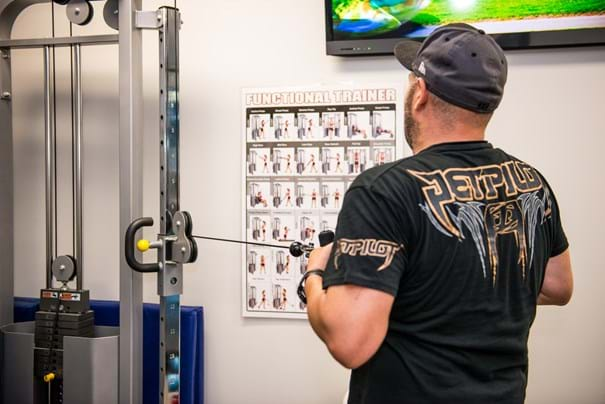
Specialised Exercise for Cardiovascular and Respiratory Health
Breathe Better, Move Easier, Live Fuller
At Exercise for Rehabilitation & Health, we understand that heart and lung conditions can significantly impact your daily life and confidence. Our specialised exercise programs are designed to help you safely improve your cardiovascular and respiratory function, manage symptoms effectively, and enhance your quality of life.
Exercise is a powerful tool for managing cardiorespiratory conditions. The right program can strengthen your heart, improve lung capacity, build endurance, and help you return to activities you enjoy. Our team works closely with your medical specialists to ensure your exercise program complements your overall treatment plan.

"We create a safe, supportive environment where you can gradually build strength and confidence. Our clinicians closely monitor your response to exercise and adjust your program accordingly, ensuring you progress at a pace that's right for you."

Our Expertise Covers a Range of Conditions
Cardiac Rehabilitation
Whether you're recovering from a heart attack, cardiac surgery, or managing ongoing heart conditions, our cardiac rehabilitation programs follow evidence-based protocols to strengthen your heart safely. We focus on gradual progression, symptom monitoring, and building both confidence and capacity.
POTS Management
Postural Orthostatic Tachycardia Syndrome presents unique exercise challenges. Our specialised POTS programs focus on reconditioned exercises, careful positional changes, and strategies to manage symptoms like dizziness and fatigue during activity. We understand the complexities of POTS and create programs that work with your body, not against it.
Pulmonary Rehabilitation
For those with COPD, asthma, pulmonary fibrosis, or other respiratory conditions, our pulmonary rehabilitation programs combine appropriate exercise with breathing techniques and energy conservation strategies. We focus on improving your functional capacity while helping you manage breathlessness effectively.
Long COVID Recovery
If you're experiencing ongoing symptoms after COVID-19 infection, our targeted programs address common issues like fatigue, breathlessness, and reduced exercise tolerance. We use a paced approach that respects your energy limitations while gradually rebuilding your strength and endurance.
Other Cardiovascular Conditions
We also provide specialised support for:
-
Hypertension management
-
Post-cardiac surgery rehabilitation
-
Heart failure exercise programs
-
Peripheral vascular disease
-
Cardiovascular disease prevention
Our Approach to Cardiorespiratory Exercise Therapy
Safety comes first. We begin with a thorough assessment that includes reviewing your medical history, understanding your current symptoms, and evaluating your exercise capacity. This allows us to create a program with the right starting point and progression plan for your specific condition.
Your program may include:
-
Monitored aerobic exercise at appropriate intensities for your condition
-
Strength training to support overall function and daily activities
-
Breathing exercises to improve respiratory efficiency
-
Energy conservation techniques for symptom management
-
Education about your condition and self-monitoring strategies
-
Lifestyle modifications to support cardiovascular and respiratory health
Frequently Asked Questions
Is exercise safe for my heart/lung condition?
Yes, when properly prescribed and monitored. Research consistently shows that appropriate exercise is beneficial and safe for most cardiovascular and respiratory conditions. In fact, not exercising often poses greater health risks. Our programs follow evidence-based guidelines specific to your condition, with careful monitoring of your response.
How soon after a cardiac event can I start rehabilitation?
This depends on your specific situation, but many people begin cardiac rehabilitation as soon as 1-2 weeks after discharge from hospital. We work closely with your cardiologist to ensure timing is appropriate, and always begin with very light activity that progresses gradually as you recover.
Will I always need to be monitored during exercise?
Initially, closer monitoring helps us ensure your safety and determine appropriate exercise levels. As you progress and learn to monitor your own symptoms, many clients transition to more independent exercise with periodic check-ins. Our goal is to help you become confident in managing your own exercise program.
What should I bring to my sessions?
Wear comfortable clothing and supportive shoes. Bring any medication you might need (such as inhalers), a water bottle, and any relevant medical reports or test results. If you use a heart rate monitor or other device, please bring that too.
Will my health insurance cover these services?
Many cardiovascular and respiratory conditions qualify for Medicare rebates through Chronic Disease Management plans. Private health insurance often provides coverage for exercise physiology services. We also accept WorkCover, TAC, DVA, and NDIS clients with appropriate documentation.
How is this different from exercising at a regular gym?
Our programs are specifically designed for your medical condition, with careful consideration of your symptoms, medications, and contraindications. Our exercise physiologists have advanced training in clinical conditions and monitor important health metrics during your sessions. We provide a higher level of support and clinical expertise than is available in general fitness settings.


